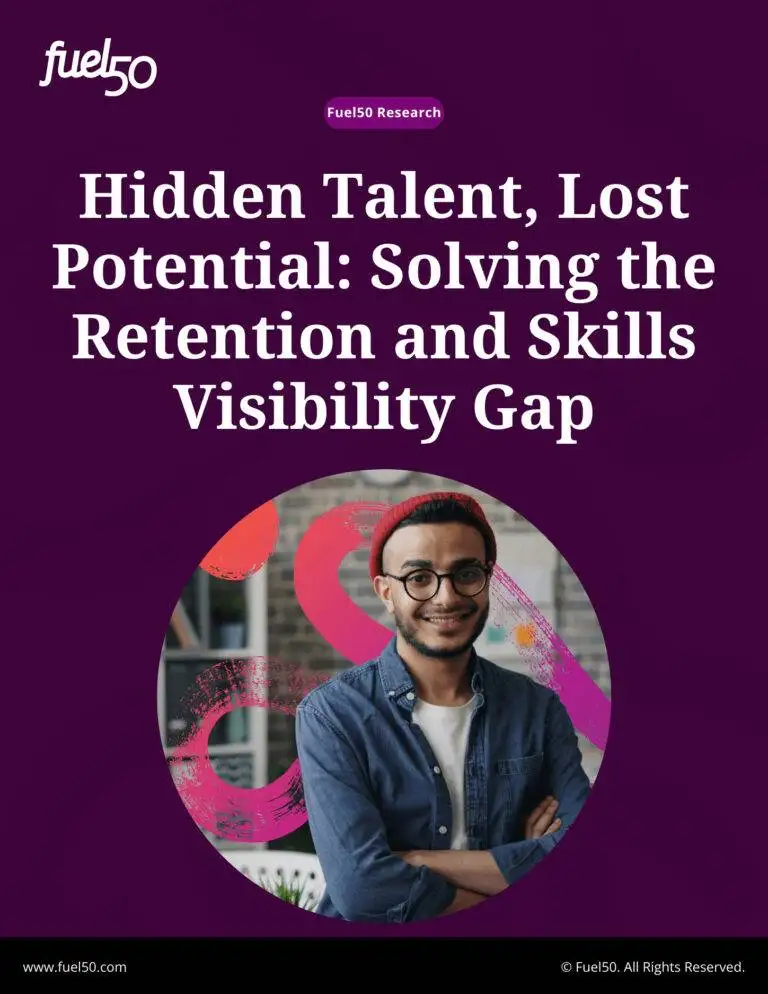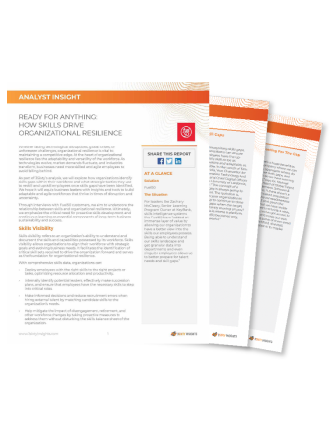As we kickstart this new year, a key business trend right now is leadership – compassionate, human-centric leadership.
Of course, leaders play an essential role within any organization, and particularly during times of crisis. What we are seeing is that, increasingly, there is a strong demand for human-centric leadership. Managers across the globe are being required to put their people first and focus on facilitating learning and growth experiences, often virtually, to transform the people experience within their organization. The result? A human-centered organization, likely with improved employee retention.
Here’s what China Gorman, the former CEO of the Great Place to Work Institute and one-time COO at SHRM (the Society for Human Resource Management), said on Fuel50’s TalentX podcast — the very best leadership focuses on two things simultaneously:
- Improving the company culture
- Being focused on the personal and professional needs of the workforce
Here’s how China Gorman explained it:
“It all really comes down to leadership, the kind of relationship you have with your employees, whether you tell the truth or not, and whether you have a personal relationship. The best rule of thumb I have for leaders is be honest, be real, be human.
But be human more than anything else. Always tell the truth, whether it’s good news or bad news, but never, ever prevaricate. Never, ever leave breadcrumbs that go in the wrong direction, and never, ever make promises that you know you cannot keep. That’s the path towards engagement going away, right alongside your employees going away.”
Gorman describes the notable need for a human-centric approach to management. Last year, Gallup examined it through the prism of the coronavirus pandemic and lockdown, focusing on what people need from their leaders as they work to manage their way through times of great crisis, as most of us have been doing for the past year.
Leading through a crisis
What Gallup found isn’t terribly surprising, but it is clearly focused on what people need during a crisis, and it does speak to a greater need for more human-centric or human-centered leadership. Here’s the gist of what the research found:
“Global citizens look to leadership for a crisis management plan — and to provide confidence that there is a way forward that they can contribute to.
In times of crisis, there are two directions human nature can take us: fear, helplessness and victimization — or self-actualization and engagement. On the latter, if leaders have a clear way forward, human beings are amazingly resilient. There is a documented ‘rally effect.’
Gallup meta-analytics have found four universal needs that followers have of leaders:
- Trust
- Compassion
- Stability
- Hope
These needs are especially urgent during crises. People look for these top leadership traits as a signal that their life will be OK and that they can be part of the solution.”
Encouraging employees to be part of the organizational problem-solving is at the heart of smart, human-centric leadership — so much so that leaders around the globe are embracing it as they start to zero in on the human-centric management concept.
“In times of COVID-19, (many) leaders are no longer around their people. … Instead, they need to be inside their … minds, which demands business leaders to become human-centric to be able to survive,” says HR expert turned business coach, Nadja Chaieb.

6 tips for becoming a more human-centric leader
Nadja Chaieb points to the four factors in the Gallup research as the critical elements that leaders should embrace as part of their larger leadership role. But, the bigger challenge is how to deliver them to workers when so many leaders are physically separated from their team.
Chaieb recently talked to the UK human resources publication Real Business, and they listed these six (6} tips to help become a more human-centric leader. They are:
- Self-reflection and self-respect. “A leader starts to create a human-centric organization only after reflecting on who they really are and accepting themselves fully. … This becomes fundamental to be able to drive a human-centric organization successfully.”
- Focus on the individual and their full potential. “Make all processes more individual-focused. Also, evaluate every employee’s personal potential and try to unleash it. Ask questions about how they see their role and contribution to the organization.”
- Build trust and get people on board. “When the team has bought in, they will go that extra mile. Share the larger vision with them, get them involved, gain their buy-in, and build trust.”
- Communicate regularly with your team in a transparent and honest way. “Employee trust helps organizations become human-centric. This trust is built by transparent and honest communication and regular feedback from leaders.”
- Have regular 1-1 sessions with each team member. “Do regular check-ins with your team and ask, ‘what’s going on?’ Find out how the work is going and how you can support them. Try to understand their perspectives and build human-centered solutions to meet their different needs and expectations.”
- Act on your coworkers’ feedback and input. “Engaging co-workers and asking for their recommendations for improvement is important, but you need to act on the valuable input you receive to really build trust and a stronger organization.”
Those are all great things for leaders to focus on, but China Gorman has one more suggestion for managers as they look to build a more human-centric leadership style — gratitude. She says:
“Be super grateful. Every opportunity that you have, be super grateful. Our employees, wherever they are in the world, whether they’re working from home or they’re commuting into an office, no matter how and where they’re working, (know that) this is a super hard time. Those employees who are sticking with us … who are innovative, who are solving problems for our customers, (dealing with) problems they’ve never seen before, they deserve our gratitude and our thanks more than ever before.
Not only can you not communicate enough, you cannot say thank you enough.”
And THAT is what human-centric leadership is all about.
China Gorman on TalentX Podcast: The State of Workplace Culture
China Gorman chats with host John Hollon about how workplace culture has fared in the wake of the pandemic. China shares her best rule of thumb for leaders as we continue through and advice to get the organization out the other side even stronger.











